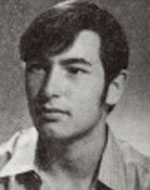Etgar (Ehrenberg), Yehoshua
Yehoshua (Shuki), son of Rivka and Avraham, was born on July 26, 1952 in Tel Aviv. He attended the Yahalom Elementary School in Ramat Gan and the Neve Magen Elementary School in Ramat Hasharon. Afterward he continued his studies at the military boarding school of the Hebrew Gymnasium Herzliya in Tel Aviv. Since the conditions of the boarding school and way of life did not match his principles, he left her after two years and moved to the Sharon High School in Ramat Hasharon. Joshua was a student beloved to his teachers and accepted by his friends. His teacher wrote about him: “Shuki was a fighting man, the sense of justice and the sense of criticism ran in him and gave him no rest, and he always fought uncompromisingly against any act that he thought was distorted and liable to cause damage to the society in it.” Joshua was very kind and generous, loved to help his friends and help in action and advice to everyone who turned to him. He was brave and bold and fearless. He had a special sense of humor. His jokes were very clever and had a lot of amusement. He had a wonderful memory and sometimes remembered details of an event – years after it happened. But above all, Shuki son of Ne’eman was devoted to his parents, who respected them very much. Shuki loved literature, modern poetry, painting and music, but most of all he loved cinema and theater. He was one of the members of the “Cinema for Youth” association, wrote two scripts: “The Death of a Beach” and “Cable”, directed and screened them. After these films were screened, Yedioth Ahronoth published an assessment list, entitled “The First Steps of the Director of the Future.” He was preparing to study film, theater and media studies at the university. Yehoshua was drafted into the IDF in the mid-August 1970’s and volunteered for the Shaked Reconnaissance Unit, where he underwent an explosive training course, a parachuting course and a driving course, and his commanders liked him and his friends. He was a very good soldier, responsible and devoted to his job, and his commanders noted all this in praise of the certificate of release from the regular army service when he was released. From the regular service with the rank of sergeant, he was assigned to the armored corps as part of his reserve service Wanted the Yom Kippur War was drafted and sent with his unit to the front in the Sinai, where Bethlehem in the central sector. On th October Tsl”d (24/10/1973), came with his half-track to the city of Suez, to turn away injured. On their way they encountered a tank that had blocked their way. When they tried to bypass the damaged tank, heavy gunfire was fired at them and Yehoshua was killed on the spot. He was brought to eternal rest in the cemetery in Kiryat Shaul. He was survived by a father, a mother and two sisters. In a letter of condolence to the bereaved family, his commander wrote: “Yehoshua was an excellent professional, courageous and devoted, and was acceptable and loved to the soldiers of the unit.” The Ramat Hasharon Local Council published a booklet commemorating its sons who fell in the war, and Joshua among them.
